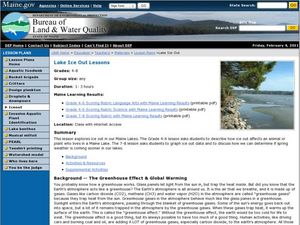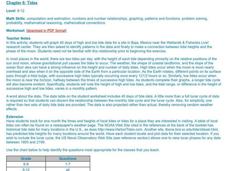Curated OER
Lake Ice Out Lessons
Students explore the greenhouse effect. For this environment lesson, students describe how "ice out" affects animals and plants who live in a Maine lake. Students graph "ice out" data and make predictions about the upcoming...
Curated OER
Keep It Cool
Students complete a science experiment to study insulation, heat transfer, and permafrost. For this permafrost study lesson, students design and test a soda insulator. Students graph their class data and discuss the results. Students...
Curated OER
Seasonal Cloud Cover Variations
Students recognize different cloud types. They determine the seaonality of various types of clouds. They graph the data and determine if a correlation exists between season, cloud cover and type of clouds most prevalent during each season.
Curated OER
Atlantic Canada Report
Ninth graders create a report that will show an in-depth knowledge of the various geographical and climatic features of Atlantic Canada. They produce various items, on paper and using the computer, to demonstrate knowledge of outcomes,...
Curated OER
Trouble in the Troposphere
Students create graphs using NASA data, compare ozone levels of several U.S. cities, analyze and evaluate the data and predict trends based on the data, and discuss and describe how human activities have modified Earth's air quality.
Curated OER
White-tailed Deer Issues
Ninth graders examine the white tail deer population in Pennsylvania and explore the impacts that the deer have on the flora and fauna. In this white-tail deer instructional activity students complete an activity and graph their...
Curated OER
Tides
Students graph 40 days of high and low tide data for a site in Baja, Mexico near the Wetlands & Fisheries Live! research center. They identify patterns in the data and finally to make a connection between tidal heights and the phase...
Curated OER
Mapping a Temperature Field
Students measure and graph temperatures. In this temperature field lesson students use a map to measure and plot field values and construct isolines and interpret the results.
Curated OER
Color Enhanced Maps
Students download or create maps with numerical weather data. They add isolines and color to create regions on their maps. They explore the visual properties of color palettes and create a visualization applying their knowledge.
Curated OER
Rate It - Working With Positive and negative Numbers
Learners practice rating things using numbers between -2 to 2. In this rating lesson, students determine what a rating scale is before rating things such as the weather, a book, or a day using the numbers -2 to 2. They examine the use of...
Curated OER
Using the Very, Very Simple Climate Model in the Classroom
Students study the relationship between the average global temperature and carbon dioxide emissions. In this weather lesson students develop a test scenario using a model then read and interpret graphs of data.
Curated OER
CSI Clamshell Investigation
Pupils explore and explain how moon snails eat and where the holes in clamshells come from and then draw conclusion from the data collected. They incorporate math and graphing skills to determine if there is a relationship to a clam's...
Curated OER
Family Letter and Algebra
In this algebra worksheet, students receive a parent informational letter. The letter discusses what will be covered in algebra that school year and has an ordering integers activity.
Curated OER
Ecology: Factors Influencing Animal Populations
Learners assess the factors affecting animal populations. Working in groups they define specific vocabulary terms and complete several activities from "Project Wild."
Curated OER
Impact Craters
Young scholars investigate the factors affecting the size of a crater. In this space science instructional activity, students collect data from the activity and graph them. They explain how velocity of impact relate to crater size.
Curated OER
How Animals Prepare for the Winter
Students study animals. In this hibernation lesson, students are read Stranger in the Woods and they discuss what various animals do in their habitat during the winter. They work as a class to create their own hibernation environment...
Virginia Department of Education
Hurricanes: An Environmental Concern
Hurricanes, typhoons, and tropical cyclones are the same type of storm, but their names change based on where they happen. Scholars use a computer simulation to learn about hurricanes. Then they hypothesize ideas to prevent hurricanes...
Curated OER
Scatter Plots
Seventh graders investigate how to make and set up a scatter plot. In this statistics lesson, 7th graders collect data and plot it. They analyze their data and discuss their results.
Curated OER
Using SWMP Data
Pupils are introduced to the SWMP system which tracks short-and long-term changes in water. Using this data, they plot and interpret the data on a graph to determine how human activities are lowering the water quality. They also identify...
Curated OER
Cloud Watchers
Second graders read "The Cloud Book" by Tomie dePaola to jumpstart their cloud study. They offer examples of liquids, solids, and gases and chart them. They observe the making of a cloud in a demonstration. They discuss and draw...
Curated OER
Temperature in The Atmosphere
In this science worksheet, middle schoolers find the answers to the five questions and they fill in the graphic organizer for the temperatures found in different heights of the atmosphere.
Curated OER
School Temperatures
Students collect and record temperatures throughout the school. Using this information they compare and contrast the temperatures recorded from various spots throughout the school.
Curated OER
Hurricanes
Eighth graders gather information on hurricanes that are affecting the world at the time of the lesson. They work together in groups to collect the data and record their information in a table. They are asked questions to finish the lesson.
Curated OER
Relative Humidity of Your School
Students predict the location where the relative humidity the highest and lowest in and around their school. They use a sling psychrometer to measure the relative humidity of the various locations.























